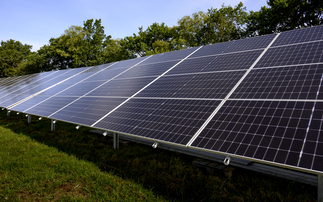Christiana Figueres: "We now have a Party-owned text that is balanced and complete"
The final official round of UN climate talks ahead of this December's crucial COP21 Paris Summit wrapped up on Friday with the adoption of the formal negotiating text for the two weeks' of talks in the French capital.
The text, which swelled from 20 pages to 63 over the course of the week, divided observers, with some hailing substantial progress on key issues and others warning a vast array of issues remain unresolved with just 10 days of official negotating time left until an ambitious new climate agreement is supposed to be adopted.
BusinessGreen rounds up the reaction from key players and observers at the Bonn talks:
UNFCCC Executive Secretary, Christiana Figueres, said:
"We now have a Party-owned text that is balanced and complete. The challenge for governments is to bring it down to a much more concise and coherent form for adoption in Paris."
French Climate Change Ambassador, Laurence Tubiana, said:
"We have a manageable text for further work in Paris. While much work remains, the text is a good basis for negotiations and negotiations need to start from the first day of the conference."
Nigel Topping, chief executive of We Mean Business, welcomed the fact the new text includes an acknowledgement 'putting a price on carbon is an important approach for cost-effectiveness of the cuts in global greenhouse gas emissions':
"Putting a meaningful price on carbon is one of the most effective policy measures to drive the transformation of global energy systems. To date 39 countries and 23 cities, states and regions are putting a price on carbon through taxes or cap and trade systems and many more plan to do so in the next few years. At the same time more than 1,000 companies are implementing an internal price on carbon in anticipation of regulation to come, many planning for prices above $40. We are delighted to see carbon pricing becoming a global norm. The widespread adoption of carbon pricing will reduce competitiveness concerns and rising carbon prices will drive further investment in a clean energy future. The decarbonisation of the economy is inevitable , irreversable and irresistible."
Steve Howard, IKEA Group's chief sustainability officer, said:
"We welcome the inclusion of carbon pricing in the UNFCCC negotiating text released today in Bonn. Ambitious climate policy, including carbon pricing, will enable business to innovate and invest in a low-carbon, prosperous future."
Jennifer Morgan, global director for the climate program at the World Resources Institute, warned the talks were still moving too slowly:
"Negotiators made some significant strides here in Bonn but a much more vigorous pace is needed to secure a strong climate agreement in just a few weeks. We've been running a marathon for years to reach to this point. Now we need an all-out sprint to get over the finish line in Paris.
"This week negotiators took full ownership over crafting the draft agreement which demonstrates their strong commitment to a successful outcome in Paris. This determination needs to continue at all levels to connect the dots between the negotiations and the ministerial gatherings ahead of COP 21.
"The current state of the draft agreement reflects how close countries are to reaching consensus on key topics. For example, progress was made on mitigation and transparency where negotiators are now debating the details, while on adaptation and finance there remain more fundamental differences.
"Over 150 countries have put forward national climate plans, an unprecedented achievement. Now countries need to solidify the rules and norms to maximize the impact of these plans and drive climate action for decades to come."
Kit Vaughan, director of CARE International's Climate Change, Poverty and Environment Network, said climate funding remained a sticking point:
"It's clear that all countries want a new climate deal, but the big question is how we will achieve this. The new draft Paris agreement we got today is manageable, but there hasn't been enough progress in many key issues, like finance. Countries need to work together to bridge gaps and scale-up ambition to limit warming to below 1.5C."
Sven Harmeling, CARE International's climate change advocacy coordinator and focal person for adaptation, and loss and damage, warned progress on loss and damage had been similarly lacking:
"Discussions on loss and damage were very polarised this week. The G77 group, representing most of the climate vulnerable countries, made a strong joint statement on why it should be part of the Paris agreement, whereas many rich countries, including the US and Canada, want no reference at all. As the EU has no clear position yet, it should help to bridge the differences."
Dr Stephen Cornelius, WWF-UK's chief adviser on climate change, said:
"It has been a tough week for the negotiators and we are much more hopeful now than we were on Monday. The Bonn climate talks have provided the options we need to take to Paris but countries will need to continue to work over the next five weeks to get the strong deal we all want and need."
Tasneem Essop, WWF's head of delegation to the UN climate talks, said there were three key issues that political leaders needed to work on before they arrive in Paris:
"A spirit of compromise will be important to reach a final agreement in Paris. But there can be no compromise on the level of ambition we need to address the climate crisis. Leaders need to prioritise a plan to address the emissions gap and regularly increase this ambition over time. Anything less than 1.5 degrees would dangerously affect the lives and livelihoods of millions of people and the rest of life on Earth.
"Ordinary people from California to Manila whose lives are being disrupted look to political leaders for solutions."
Christian Aid's Senior Climate Advisor, Mohamed Adow, said that despite the fractious end to the negotiations as delegates worked to fine-tune the agreement, overall progress had been good:
"At the end of the last round of talks we had an 80-page text. We now leave Bonn with a manageable document, which contains some robust content that will form the basis of the world's global climate deal. At the same point before the Copenhagen climate summit in 2009 there were 180 pages so we're in a far better position this time around.
"The reason we have got this far in negotiating a global climate agreement, including poor countries as well as big emitters, is because rich countries promised to deliver a balanced outcome that incorporated climate finance. That is what helped win the cooperation of the developing world. But now that we're on the brink of sealing the deal, rich countries are trying to wriggle out of their commitments. Rich countries cannot erase history: neither their past emissions nor their promises on finance, which have been instrumental in getting us to this point... The deal is ripe but we need the finance if we're going to pick the fruit.
IETA's director of international policy, Jeff Swartz, said the text offered improved prospects for carbon markets:
"We welcome progress made this week on advancing the text for the Paris agreement, despite divisions over climate finance. Parties managed to focus on the job at hand, and made headway on the negotiating text for Paris.
"IETA is particularly pleased to see a more robust section on mitigation that clarifies the market provisions. It now makes clear that countries can cooperate on markets with proper accounting of transfers, and it sets policy to avoid double-counting of emissions reductions. It also creates a sustainable development crediting mechanism. All three of these provisions are similar to what we and 19 other business groups called for at the start of the week in a letter sent to more than 90 governments.
"There are also several references to 'international transferrable mitigation outcomes', which is in line with what IETA has been proposing to governments for more than a year. This new text is a solid basis to work from going in to the Paris talks in five weeks' time."
Forest Trends REDD+ expert, Gustavo Silva-Chávez, noted that the plan for a network of INDC climate action plans could be tweaked slightly:"
"One significant outcome of this week's session is that a concept central to the negotiations, the INDC (Intended Nationally Determined Contribution), has been scrapped and replaced with NDMCs - Nationally Determined Mitigation Contributions/Commitments/Components. Which "C-word" applies varies from country to country: for developed nations the "C" is considered to signify something binding; for developed countries it is meant to be less mandatory. However, chances are that different country blocs will be pushing back on such differentiation in order to not fall back unto a mindset that defines responsibilities differently according to a country's development status, based on their development status in the 1990s."
Mithika Mwenda, Secretary General of the Pan African Climate Justice Alliance, a network of over 1,000 groups in 45 African countries, warned issues relating to climate justice were still not being adequately addressed:
"While ordinary people are facing worsening impacts such as Hurricane Patricia in Mexico and Typhone Koppu in the Philipines, the US is leading the wealthier countries in an effort to weaken the rules for developed countries, undermining international climate policy.
"President Obama received a Nobel Prize for his contributions in international affairs, including climate change, on the promise that he would take us forward toward a just and safe future. Obama's legacy is on the line if he takes us backwards, dismantling decades of established international climate law."
Lidy Nacpil, coordinator of the Asian Peoples' Movement on Debt and Development, said climate funding was likely to prove a deal-breaker at the Paris Summit:
"Climate finance could be the deal breaker at the Paris climate talks. We've seen too much creative accounting and green washing this week, more of the same OECD methodology of over-stating the amount of climate finance available to developing countries. It's time for the United States and other developed countries to stop cooking the books and come forward with some real money to address climate solutions."










